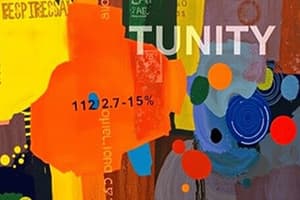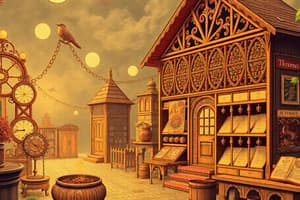Podcast
Questions and Answers
Which of the following is NOT considered a factor of production?
Which of the following is NOT considered a factor of production?
- Labor
- Technology (correct)
- Land
- Capital
What does the factor of production 'Land' mainly encompass?
What does the factor of production 'Land' mainly encompass?
- Machinery and equipment
- Human resources
- Intellectual property rights
- Natural resources (correct)
Which factor of production is often referred to as one of the 'gifts of nature'?
Which factor of production is often referred to as one of the 'gifts of nature'?
- Technology
- Land (correct)
- Labor
- Capital
What does the factor of production 'Labor' mainly refer to?
What does the factor of production 'Labor' mainly refer to?
Which factor of production includes tangible items like buildings and machinery?
Which factor of production includes tangible items like buildings and machinery?
What aspect significantly impacts the economy's growth and well-being?
What aspect significantly impacts the economy's growth and well-being?
What is the role of capital in the economy?
What is the role of capital in the economy?
How do entrepreneurs drive economic growth?
How do entrepreneurs drive economic growth?
According to Paul Samuelson, what do rental prices help determine?
According to Paul Samuelson, what do rental prices help determine?
What is the concept of resource allocation crucial for?
What is the concept of resource allocation crucial for?
Which factors of production move from low-rental areas to high-rental areas?
Which factors of production move from low-rental areas to high-rental areas?
Why is it essential for economists, policymakers, and citizens to understand factors of production?
Why is it essential for economists, policymakers, and citizens to understand factors of production?
Flashcards
Land
Land
All natural resources, 'gifts of nature'.
Labor
Labor
Physical and mental efforts to produce goods/services.
Capital
Capital
Man-made resources used for production.
Entrepreneurship
Entrepreneurship
Signup and view all the flashcards
Rental Prices
Rental Prices
Signup and view all the flashcards
Resource Allocation
Resource Allocation
Signup and view all the flashcards
Factor Movements
Factor Movements
Signup and view all the flashcards
Comparative Advantage
Comparative Advantage
Signup and view all the flashcards
Study Notes
Understanding Economics: Factors of Production
Within the vast landscape of economics, one fundamental concept that forms the backbone of production and wealth creation is the understanding of factors of production. These factors are the resources that individuals, businesses, and entire economies use to generate goods and services. By delving into this core topic, we'll unravel the components of production that underlie the prosperity of our global economy.
Land
Land encompasses all natural resources that are given or found in a particular location. These resources include natural land, water, and minerals. Land is often referred to as one of the "gifts of nature" because it cannot be created or destroyed, but its quality, quantity, and accessibility differ from place to place.
Labor
Labor refers to the workforce or human capital of an economy. It encompasses the physical and mental efforts that individuals put forth to produce goods or services. Labor provides a key source of value creation and is considered one of the most variable factors of production. The skills, productivity, and motivation of workers significantly impact the economy's growth and well-being.
Capital
Capital represents all man-made resources used for production purposes, including tangible items like buildings, machinery, inventories, and intangible resources such as patents and intellectual property rights. Capital plays a vital role in enhancing productivity, promoting efficiency, and facilitating innovation.
Entrepreneurship
Entrepreneurship refers to the process of identifying opportunities, taking risks, and organizing and operating a business. Entrepreneurs are visionaries whose efforts drive economic growth by challenging the status quo, introducing new products and services, and creating jobs. They make up the fourth factor of production, although some economists may not include entrepreneurship as a separate factor but rather as an overarching concept that influences the use of the other three factors.
Rental Prices and Factor Proportions
The economist and Nobel laureate Paul Samuelson introduced the concept of rental prices to describe how the prices of factors of production are determined in a competitive market. Rental prices help determine the optimal proportion of each factor that a firm should use in the production process. The optimal proportions are achieved when the firm is maximizing its profit, given the market prices of each factor.
Factor Movements and Trade
Resource allocation, or the process of matching the supply and demand for factors of production, plays a critical role in economic development and international trade. Factors of production move from a low-rental area, where they are more abundant and less expensive, to a high-rental area, where they are scarcer and more expensive. As a result, international trade often occurs as countries specialize in producing goods and services for which they have a comparative advantage.
Conclusion
The factors of production are the fundamental inputs that underlie the production of goods and services in an economy. These factors, land, labor, capital, and entrepreneurship, interact with each other to generate wealth and drive economic growth. By understanding these interconnected factors, we can better appreciate the complex and dynamic nature of the global economy and the forces that shape it. As economists, policymakers, and engaged citizens, it is essential to remain informed about the factors of production's intricacies to make informed decisions and contribute to a prosperous and sustainable future.
Studying That Suits You
Use AI to generate personalized quizzes and flashcards to suit your learning preferences.




